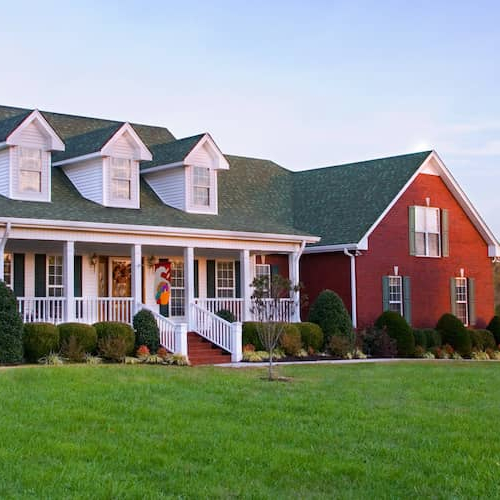Mortgage rate lock: A guide to protect you from rate fluctuations
Feb 6, 2026
•7-minute read
Mortgage interest rates can fluctuate rapidly over time – they move up and down from day to day and even hour to hour. As a home buyer, it’s important to keep an eye on interest rate fluctuations. Even minor changes to mortgage rates can impact the amount you pay when you refinance or close on a home loan. That’s where a mortgage rate lock can help.
A mortgage rate lock protects you from climbing interest rates and freezes your rate. As you begin the home buying process, it’s important to understand how a mortgage rate lock works, why you should lock your mortgage rate and when is the best time to lock in the rate on your loan.
What is a mortgage rate lock?
A mortgage rate lock, also known as rate protection, keeps your interest rate from rising between applying for a mortgage and closing on your new loan. A rate lock allows borrowers to get the best mortgage rate possiblewhile buying a home or refinancing. If interest rates go up after you’ve locked in your rate, you get to keep the lower rate.
What’s a mortgage rate lock with a float-down option?
On the other hand, if you lock your rate and interest rates fall, you can’t take advantage of the lower rate unless your rate lock includes a float-down option. A float-down option allows you to take advantage of an interest rate decrease during your rate lock period.
How long can you lock in a mortgage rate?
Your rate will stay locked for a specified period of time. The lock period will vary based on where you live, the loan type, the loan terms and the mortgage lender you choose. Most rate locks are typically available for 15 – 60 days.
Can you extend your mortgage rate lock?
If your mortgage rate lock expires before your loan closes, you may have the option to pay a fee to extend the lock period. This fee is often a percentage of the total loan amount. Otherwise, you’ll get the interest rate that’s available before closing.
Can a lender void your rate lock?
If things change concerning your mortgage application or financial situation, your lender may void your rate lock. Since factors like income and credit influence your interest rate, changes to your situation may mean you’re no longer eligible for the original offered rate. Opening a new line of credit while you’re getting a mortgage, for example, may change your debt-to-income ratio (DTI) or credit score. Your lender will need to reevaluate your eligibility for the loan and the locked interest rate.
When can you lock in a mortgage rate?
You can lock in your rate from the moment you receive initial loan approval to 5 days before closing. Some lenders may even lock your rate when they send the Loan Estimate. However, your rate lock has an expiration date. Once the lock period ends, your interest rate will increase or decrease even if you haven’t completed your refinance or home purchase.
That’s why it’s essential to get the timing on your mortgage rate lock just right to secure a lower interest rate and APR for your new mortgage.
Should you lock your mortgage rate today?
If you’re buying a home, you may be wondering whether you should lock your mortgage rate. Locking it in is a smart choice if you’re happy with your rate when you get approved. It's best to lock your rate when you’re comfortable with the amount of your monthly mortgage payment.
Be aware of rate lock fees
While locking your rate can save you money over time, you should also check with your lender about any charges associated with a rate lock. Some banks and financial institutions charge rate lock fees, depending on the type of mortgage you’re using. You can pay this fee upfront or include it in your closing costs.
Consider current mortgage rate trends
To know whether you should lock your rate today research how rates have been moving. If rates have been rising, it may be best to lock your rate as soon as your mortgage or refinance is approved. If rates are dropping, not locking your rate may pay off.
Just keep in mind that no one can fully predict what rates will do. Floating your rate can be risky. Sometimes floating works out and rates may drop a small amount, but not always. Even a small increase in interest rates can cost you thousands of dollars over the life of your loan.
Determining whether you should lock in today
Let’s pretend you’re purchasing a $350,000 home with a down payment of a little over 5% at $20,000. You choose a 30-year fixed-rate mortgage while the interest rate is 7.125%. Your monthly payment of principal and interest before property taxes and home insurance will be $2,223. If interest rates rise to 8% during the mortgage process and you don’t have a mortgage rate lock, you could find yourself paying $2,421 a month after closing. On the other hand, if rates drop to 6.5% during the mortgage process and you have a rate lock, you’ll miss out on the chance to pay just $2,086 a month after closing.
How to lock in a mortgage rate
In a rising rate environment, it’s important to lock your rate to take advantage of optimal interest rates. You can use Rocket Mortgage® to lock your rate online. Here’s how it works:
- Create an account: Once you decide to buy or refinance your home, talk to your loan officer. They’ll ask a few questions about your income, debt and assets. Create a Rocket Account if you don’t already have one.
- Research recommended mortgage solutions: Explore current interest rates and estimate monthly mortgage payments using a mortgage calculator. Customize the numbers to fit your budget.
- Apply and wait for mortgage approval: When you’re ready to get a new mortgage, you’ll need to submit an application for the type of financing you want. Make sure you include all required documentation and personal information.
- Lock in your interest rate online: Once you get lender approval and are happy with your rate, you can lock it in and relax knowing you’re protected from rising rates.
Rocket Mortgage is available 24/7. You can lock your rate whenever you want.
Does the loan type affect the mortgage rate lock?
The type of mortgage you choose may affect the specifics around your mortgage rate lock, including whether you’re eligible for a lock and if you can extend it. Deciding when to lock in your interest rate is part of the mortgage process, regardless of the loan.
Why do mortgage rates change?
Several factors influence the fluctuation of mortgage interest rates. These include changes to:
- The economy
- Current demand for mortgages
- Financial markets
- The federal funds rate
When the economy is strong and healthy, interest rates tend to rise. And when the economy slows, the demand for mortgages also slows and mortgage rates typically drop.
Assuming the example of a slowing economy, the Federal Reserve adjusts the federal funds rate (the rate at which banks and other financial institutions borrow money) down with the hope that lower interest rates will spur growth.
These lower interest rates, in turn, affect financial markets (for mortgages, specifically mortgage-backed securities) and mortgage rates go down until the economy begins to recover.
As the economy improves, the Federal Reserve will raise the federal funds rate to avoid heavy inflation and the entire process shifts as mortgage demand increases, financial markets price mortgage securities higher, and mortgage rates rise.
The bottom line: A mortgage rate lock can save you money
Interest rates can fluctuate due to the housing market and demand. Mortgage rates are also based on your personal situation, such as your financing type, down payment and loan amount. A rate lock is an opportunity to refinance or secure a mortgage with today’s rate, regardless of whether the rate changes before you actually close on your loan. Rate locks can provide protection, peace of mind and some control over the refinancing or home buying process.
Want to get your rate locked in as soon as possible? Start your mortgage application with Rocket Mortgage today.

Victoria Araj
Victoria is a former Team Leader of editorial content at Rocket Mortgage and she held roles in mortgage banking, public relations and more in her 19+ years with the company. She holds a bachelor’s degree in journalism with an emphasis in political science from Michigan State University, and a master’s degree in public administration from the University of Michigan.
Related resources

8-minute read
What are mortgage points and should you buy them?
Mortgage discount points can be purchased to lower the interest rate on a new loan. Use this guide to help you decide if you should buy them.
Read more
7-minute read
What to expect from a refinance appraisal
Thinking about refinancing your home loan? Learn more about the refinance appraisal process, what to expect and how to prepare your home to get the most value.
Read more

7-minute read
What is a mortgage rate?
A mortgage interest rate represents how much you’re paying to borrow funds, expressed as a percentage. Learn more about what determines your rate.
Read more